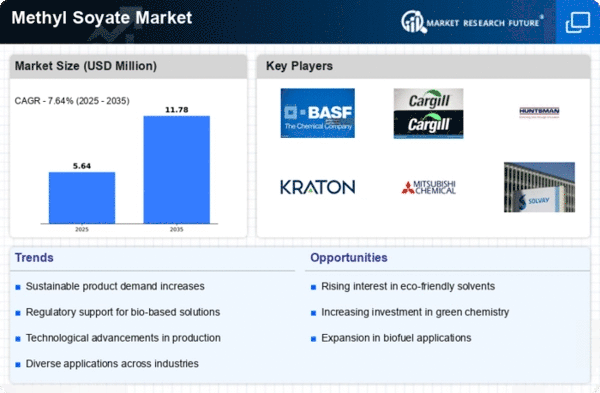Top Industry Leaders in the Methyl Soyate Market
 The methyl soyate (MS) market, a key player in the biofuel arena, is witnessing a dynamic landscape shaped by established giants and emerging innovators. Understanding the strategies, influencers, and recent developments is crucial for navigating this ever-evolving space.
The methyl soyate (MS) market, a key player in the biofuel arena, is witnessing a dynamic landscape shaped by established giants and emerging innovators. Understanding the strategies, influencers, and recent developments is crucial for navigating this ever-evolving space.
Market Share Determinants:
-
Production Capacity and Cost Efficiency: Scale matters. Large players like BASF and Cargill boast significant production capacities, allowing for economies of scale and cost-effective production. Smaller players, however, can compete by focusing on niche markets or differentiated products. -
Technological Advancements: Innovation is key. Companies like Vertec BioSolvents are spearheading research on greener production processes, while Stepan Company is focusing on cold flow properties, all aimed at enhancing MS's appeal. -
Supply Chain Integration: Securing reliable soybean feedstock is crucial. Players like Cargill, with their vertically integrated supply chains, have an edge over smaller companies reliant on external sources. -
Regulatory Landscape: Government policies and incentives can significantly impact demand. The US Renewable Fuel Standard and EU's RED II mandates are driving MS adoption, benefiting players with strong presence in these regions. -
Marketing and Distribution Channels: Brand recognition and effective distribution networks are crucial. Established players like BASF leverage their global reach, while smaller players can leverage targeted marketing and partnerships with regional distributors.
Strategic Playbook:
-
Diversification: Expanding into related biofuel markets like biodiesel or renewable chemicals can mitigate risk and leverage existing infrastructure. -
Sustainability Focus: Emphasizing green production processes, carbon footprint reduction, and circular economy initiatives can attract environmentally conscious customers. -
Partnerships and Collaborations: Joining forces with research institutions, agricultural cooperatives, or other biofuel players can accelerate innovation and market penetration. -
Mergers and Acquisitions: Consolidating production capacities and expertise through strategic acquisitions can provide a competitive edge. -
Regional Focus: Tailoring product offerings and marketing strategies to specific regional regulations and demands can unlock new market opportunities.
Key Players
- BASF SE
- Stepan Company
- Cargill, Incorporated
- Camco Chemical Co. Inc.
- Florida Chemical Company
- Vertec BioSolvents
- Unicon Fibro Chemicals Pvt. Ltd.
Recent Developments:
-
August: Technological advancements in cold flow properties improve MS's winter performance, expanding its application potential. -
September: Concerns about the proposed US biofuel mandate reduction lead to market volatility. -
October: The EU's new sustainability criteria provide a boost for MS producers with a focus on green production processes. -
November: Increased investments in research and development activities signal a commitment to innovation in the MS market. -
December: Growing adoption of MS in the aviation sector emerges as a promising new market opportunity.










